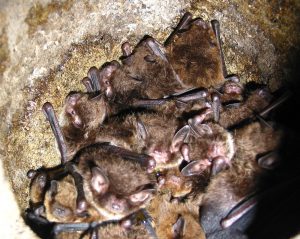Most house owners never discover bats in their houses until they need to carry out work on their attic, for example.
This is because bats rarely cause problems in houses.
Even though they look superficially similar to mice and rats they are not closely related to these mammals.
Bats’ teeth are designed for munching insects and so won’t want to or be able to cause damage to woodwork or cables.
They do not build nests and will not eat the same food as humans.
When bats are roosting in a building they just hang up and at sunset, they emerge to eat all the midges and mosquitoes in your garden.
Their droppings are made almost entirely of chitin (the hard material covering insects), and will disintegrate into metallic looking dust, rather than rotting like rodent droppings.
The video below shows a colony of Brown Long-Eared Bats in an attic using a thermal imaging camera (taken under NPWS by Karen Healy).
If the droppings build up in large colonies (say 200 bats) they may smell. However, this is uncommon and it is particularly unusual for the smell to be detectable in the dwelling space.
There are a number of solutions.
If the droppings are easy to remove they make excellent garden fertiliser. A sheet of plastic can sometimes be spread underneath the bats to collect the ‘bat guano’. In some tropical countries with vast bat roosts in caves, the guano is harvested commercially as fertiliser.
In some cases, it may be possible to build a bat box inside the roof spaces, which helps to contain the problem. The bats come and go in the box without really entering the attic at all. It is important also to check for possible underlying problems such as dampness or poor attic ventilation which may prevent droppings from drying out fully. If you have a problem with a smell from a bat roost in your house you can contact your local National Parks and Wildlife, Conservation Ranger for advice on what to do. Their number is 01-888 2000. In Northern Ireland you can contact the Northern Ireland Environment Agency on 028 9056 9605.
If bats are regularly found flying in the dwelling part of a house it may be that there is a crevice where pipes or wires come down from the attic and bats are getting in that way. They only need a gap of 1.5x2cm to squeeze through. Just stuffing up the hole with newspaper or cloth should fix the problem.
The other problem that sometimes occurs in bat roosts is that young bats may fall into uncovered water tanks. Every house owner should ensure that their water tank is covered – not just to prevent bats from trying to take a drink and drowning – but to prevent other animals such as mice, or dust and fibres from falling in.

